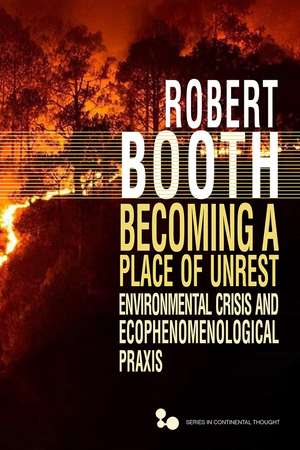Becoming a Place of Unrest: Environmental Crisis and Ecophenomenological Praxis: Series In Continental Thought
Autor Robert Boothen Limba Engleză Hardback – 6 sep 2021
The key to mitigating the environmental crisis isn’t just based on science; it depends upon a profound philosophical revision of how we think about and behave in relation to the world. Our ongoing failure to interrupt the environmental crisis in a meaningful way stems, in part, from how we perceive the environment—what Robert Booth calls the "more-than-human world.” Anthropocentric presumptions of this world, inherited from natural science, have led us to better scientific knowledge about environmental problems and more science-based—yet inadequate—practical “solutions.” That’s not enough, Booth argues. Rather, he asserts that we must critically and self-reflexively revise how we perceive and consider ourselves within the more-than-human world as a matter of praxis in order to arrest our destructive impact on it. Across six chapters, Booth brings ecophenomenology—environmentally focused phenomenology—into productive dialogue with a rich array of other philosophical approaches, such as ecofeminism, new materialism, speculative realism, and object-oriented ontology. The book thus outlines and justifies why and how a specifically ecophenomenological praxis may lead to the disruption of the environmental crisis at its root. Booth’s observations and arguments make the leap from theory to practice insofar as they may influence how we fundamentally grasp the environmental crisis and what promising avenues of practical activism might look like. In Booth’s view, this is not about achieving a global scientific consensus regarding the material causes of the environmental crisis or the responsible use of “natural resources.” Instead, Booth calls for us to habitually resist our impetus to uncritically reduce more-than-human entities to “natural resources” in the first place. As Booth recognizes, Becoming a Place of Unrest cannot and does not tell us how we should act. Instead, it outlines and provides the basic means by which to instill positive and responsible conceptual and behavioral relationships with the rest of the world. Based on this, there is hope that we may begin to develop more concrete, actionable policies that bring about profound and lasting change.
Din seria Series In Continental Thought
-
 Preț: 145.91 lei
Preț: 145.91 lei - 23%
 Preț: 559.51 lei
Preț: 559.51 lei -
 Preț: 231.22 lei
Preț: 231.22 lei -
 Preț: 229.43 lei
Preț: 229.43 lei - 23%
 Preț: 474.88 lei
Preț: 474.88 lei - 23%
 Preț: 476.35 lei
Preț: 476.35 lei - 23%
 Preț: 482.59 lei
Preț: 482.59 lei - 23%
 Preț: 480.96 lei
Preț: 480.96 lei - 23%
 Preț: 530.07 lei
Preț: 530.07 lei -
 Preț: 343.51 lei
Preț: 343.51 lei -
 Preț: 284.24 lei
Preț: 284.24 lei - 23%
 Preț: 502.54 lei
Preț: 502.54 lei - 23%
 Preț: 475.64 lei
Preț: 475.64 lei - 23%
 Preț: 474.43 lei
Preț: 474.43 lei - 23%
 Preț: 479.78 lei
Preț: 479.78 lei - 23%
 Preț: 472.66 lei
Preț: 472.66 lei - 23%
 Preț: 476.35 lei
Preț: 476.35 lei - 23%
 Preț: 475.35 lei
Preț: 475.35 lei - 23%
 Preț: 563.79 lei
Preț: 563.79 lei - 23%
 Preț: 480.80 lei
Preț: 480.80 lei -
 Preț: 286.14 lei
Preț: 286.14 lei - 23%
 Preț: 471.91 lei
Preț: 471.91 lei - 23%
 Preț: 560.86 lei
Preț: 560.86 lei - 23%
 Preț: 654.38 lei
Preț: 654.38 lei - 16%
 Preț: 583.70 lei
Preț: 583.70 lei - 10%
 Preț: 583.32 lei
Preț: 583.32 lei - 10%
 Preț: 584.23 lei
Preț: 584.23 lei -
 Preț: 280.38 lei
Preț: 280.38 lei - 19%
 Preț: 525.63 lei
Preț: 525.63 lei - 52%
 Preț: 262.58 lei
Preț: 262.58 lei - 39%
 Preț: 331.73 lei
Preț: 331.73 lei - 10%
 Preț: 585.99 lei
Preț: 585.99 lei
Preț: 586.41 lei
Preț vechi: 649.82 lei
-10% Nou
Puncte Express: 880
Preț estimativ în valută:
112.21€ • 117.47$ • 92.85£
112.21€ • 117.47$ • 92.85£
Carte indisponibilă temporar
Doresc să fiu notificat când acest titlu va fi disponibil:
Se trimite...
Preluare comenzi: 021 569.72.76
Specificații
ISBN-13: 9780821424568
ISBN-10: 0821424564
Pagini: 288
Dimensiuni: 152 x 229 x 25 mm
Greutate: 0.56 kg
Editura: Ohio University Press
Colecția Ohio University Press
Seria Series In Continental Thought
ISBN-10: 0821424564
Pagini: 288
Dimensiuni: 152 x 229 x 25 mm
Greutate: 0.56 kg
Editura: Ohio University Press
Colecția Ohio University Press
Seria Series In Continental Thought
Recenzii
“In Becoming a Place of Unrest, Robert Booth builds on the insights of ecofeminists, new materialists, and (especially) phenomenologists to develop an original and highly compelling environmental philosophy. The book is not just an exemplary work of ecophenomenology; it is, more generally, an important contribution to environmental thought.”—Simon P. James, author of Environmental Philosophy: An Introduction
Notă biografică
Robert Booth has lectured in philosophy at the University of Liverpool, the University of Manchester, and Liverpool Hope University. His research focuses mainly on how work done at the intersection of phenomenology, ecofeminism, and new realist metaphysics might inform practical means of tackling the environmental crisis and other social ills.
Cuprins
Preface Acknowledgments List of Abbreviations Introduction 1. Perception and Unrest 2. Ecofeminism and Ecophenomenology 3. Seeing Better 4. The Specter of Correlationism 5. Androcentrism, Nondiscursive Grounds and the Hyperdialectic 6. Radical Reflection, Reversibility, and the Flesh “Conclusions”; or, Becoming a Place of Unrest Notes References Index
Descriere
In this bold argument, Robert Booth asserts that the environmental crisis stems from our anthropocentric understanding of, and behavior in, the more-than-human world. Linking environmental phenomenology to ecofeminism, he shows why and how an ecophenomenological praxis may interrupt the environmental crisis at its source.
